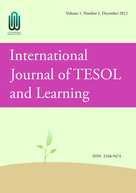


Volume 11 Issues 1-4 (2022-12-31)
Volume 10 Issues 3&4 (2021-12-31)
Volume 10 Issues 1&2 (2021-06-30)
Volume 9 Issues 3&4 (2020-12-31)
Volume 9 Issues 1&2 (2020-06-30)
Volume 7 Issues 3&4 (2018-12-31)
Volume 6 Issues 3&4 (2017-12-31)
Volume 6 Issues 1&2 (2017-06-30)
Volume 5 Issues 1&2 (2016-06-30)
This study investigated the relationship between metacognition and academic achievement in a sample of 134 Turkish pre-service EFL teachers. Participants completed Metacognitive Awareness Inventory (MAI) as a measure of metacognition. Participants’ course scores and grade point averages (GPAs) at the end of the semester were aggregated as a measure of academic achievement. The findings revealed significant correlations between metacognitive awareness, exam scores and GPA. Both knowledge of cognition and regulation of cognition significantly contributed to the prediction of variation in students’ GPAs, with regulatory skills overweighing knowledge of cognition as a predictor of academic achievement. The overall metacognition accounted for 36.2% of the variance in academic achievement, suggesting that students with higher levels of metacognition reap the rewards of academic achievement. Participants’ GPA and gender differences were also found to moderate metacognitive awareness significantly, with females having and making use of more metacognitive skills and strategies. Given the importance of developing self-regulated learners, the findings of the study may contribute to the betterment of learning outcomes and provide meaningful insights for curriculum developers to provide metacognition-based instruction during teacher education programs.
Due to their instant scoring and feedback capacity, Automated Essay Scoring (AES) systems gained a lot of attention from teachers all over the world. AES is a technology that is a capable of scoring essays within seconds. This aspect of AES made it a critical component of large scale writing assessments. For instance, Educational Testing Service (ETS) used e-rater to score Management Admissions Test (GMAT) AWA (Analytical Writing Assessment) between 1999 and 2006 and to rate TOEFL iBT writings since 2009. Furthermore, AES technology has been largely used in middle schools and high schools as well as colleges and universities as their instructional applications are capable of providing instant feedback on various categories of writing in addition to scoring. Thus, this review article aims to have a closer look into the AES technology. It begins with a background review of the AES technology and move on to different types of AES systems and related research before discussing the limitations of AES research and future directions regarding their use in English as a Second or Foreign Language (ESL/EFL) classrooms.
This paper reports the results of an empirical study assessing the effectiveness of online peer review by QQ group chatting mode. About 60 non-English major freshmen in a key Chinese university writing course were randomly selected as the subjects. Questionnaires and follow-up interviews were designed to investigate the learner’s attitudes and perceptions for such mode. Then the data, together with the online review records were processed and analyzed to find out the answers to the following two questions: 1) What are the features and effectiveness of online peer review by QQ group chatting mode? 2) Comparing to face-to-face peer review, what are the potential advantages and disadvantages of online mode? It is found that comparing to face-to-face peer review, online group discussion mode was helpful to both the writer and the reviewers by providing more objective comments and encouraging students’ autonomous collaborative study and explorations. It is also suggested that online group discussion should be carried out in small groups to attain better results.
The 3rd Untested Ideas International Research E-Conference
Identifying Untested Practices
June 26 – 28, 2015
The 3rd Untested Ideas International Research E-Conference
Identifying Untested Practices
June 26 – 28, 2015